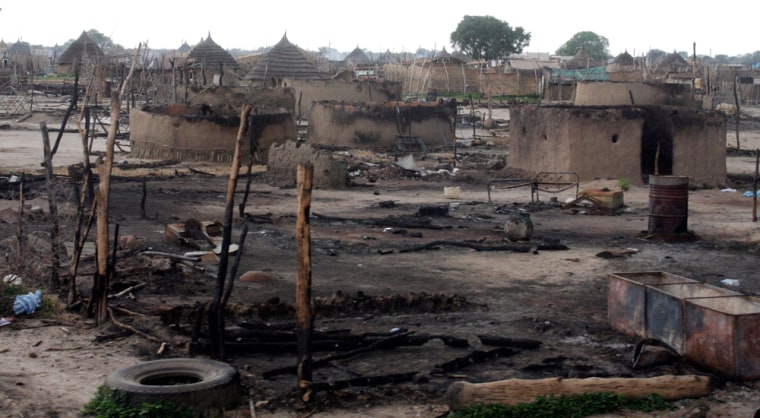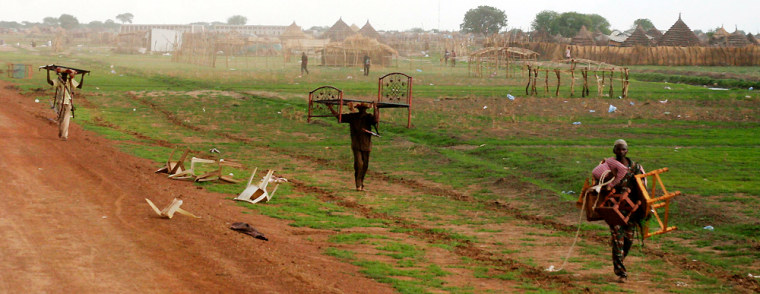Smoke still rises from charred huts and the only people left behind in this town of 30,000 in the oil-rich region are the looters and the army. The worst fighting in years between Sudanese government forces and former southern rebels has laid waste to Abyei.
The fighting, which broke out two weeks ago, threatened a 2005 peace treaty that ended a two-decade civil war between north and south in which 2 million people died. That agreement created a unity government between north and south, and left Southern Sudan a semi-autonomous region with its own government and military forces.
Abyei lies just north of the disputed boundary line with Southern Sudan in a volatile region that remains contested despite the peace agreement. It is coveted by both north and south because of its oil resources and green fields used for grazing cattle.
The fighting in Abyei flared at the same time the U.N. was warning of a dangerous escalation of violence on another Sudanese front — the Darfur conflict. Earlier this month, a Darfur rebel group staged an attack just outside the capital Khartoum for the first time since that conflict in western Sudan began in 2003.
Journalists who visited Abyei Friday with the U.N. under heavy security saw a ghost town where devastation was almost total.
The town's dirt roads were strewn with plastic chairs, beds, and clothes, apparently dropped by frenzied looters. Fires still raged in some huts.
Looters, who roamed the streets freely, and Sudanese government soldiers appeared to be the only people left in the town.
Villages on the move
U.N. officials estimate the 30,000 residents and 20,000 from neighboring villages fled at the height of the fighting which erupted over a personal argument between government soldiers and the former southern rebels of the Sudan People's Liberation Army, according to witnesses.

The U.N. says another 40,000 in neighboring villages may also be on the move, fearing the spread of hostilities.
Jehangir Qazi, the Special Representative of the Secretary-General in Sudan, said the violence that flared in Abyei could easily spread and threaten the entire peace accord. He spoke after visiting the embattled town.
"It just doesn't exist anymore," he said of Abyei. "It is absolute devastation. It is totally charred."
Since the peace deal, many ethnic Africans who fled Abyei during the civil war have returned. Now, they are fleeing again.
"I was running with fire behind me. I lost my children on the way." said Awal Dau, a 44-year-old Abyei resident who fled to Agok, a village about 25 kilometers south.
'Killing everywhere'
Nyakum Bakonly Chan, a frail 50-year old woman, said she never left Abyei at the height of civil war. But last week, she hid under her bed for two days while fighting raged, until her son carried her out on his shoulders and they fled.
"Back then, there were no heavy machine guns. Now, it was fire everywhere. It was killing everywhere," she said from Agok.
The fighting ended when the southern rebels were pushed back by the Sudanese forces, who remain in the town center.
There have been no meeting by leaders of the two sides to work things out.
The north-south civil war pitted the mostly Christian southerners against the Arab-dominated government to the north. The southerners accused the north of neglect, discrimination and unfair allocation of resources. Despite three years of peace, many old grievances and mistrust still persist.
Peace deal threatened
The government in Khartoum rejected a border demarcation proposed in 2005 by an international commission that would have put Abyei in the south. This left the fate of the town to be determined in two future votes — the 2009 national election and a 2011 referendum on whether the south secedes.
Khartoum has a major interest in keeping control of Abyei, located in a region where at least three major oilfields are. The International Crisis Group estimated oilfields in the area brought in about $670 million for Sudan in 2006, about 13 percent of its income from oil exports that year.
For southerners, many of their leaders come from Abyei, and have vowed to reclaim it.
Under the peace treaty, all troops were supposed to withdraw from the border zone to allow it to be patrolled by U.N. peacekeepers and joint units from north and south. But in violation of that agreement, both sides keep their separate forces in and around the town.
Since the peace agreement, the two sides have been jockeying for position within Abyei, and tension has often erupted into protracted and violent confrontations.
Aiming for takeover, Sudan alleges
Brig. General Osman al-Aghbash, the Sudanese army spokesman, said this time SPLA forces attacked the town after a cease-fire, aiming to take it over.
The army forcefully expelled the SPLA forces, after 22 of its soldiers were killed, army officials said.
There are no figures from the SPLA on their casualties, but medics in Agok said they treated about 130 southern fighters.
The southern leaders say the presence of the Sudanese forces is the cause of the tension.
This is not the first time Abyei has strained the peace deal. In October 2007, southern cabinet ministers walked out of the unity government over a number of disputes, including Abyei — raising fears the peace could collapse. The ministers rejoined the government in December, having settled most of their differences.
The U.N.'s Qazi said the two sides have not been able to reach a compromise on a number of issues related to the peace deal, primarily Abyei. He called on them to take "tough decisions."
"We can see that with any one issue, with Abyei in particular, if violence flares up it could easily spread to other areas and easily threaten the whole" peace deal, he said.
